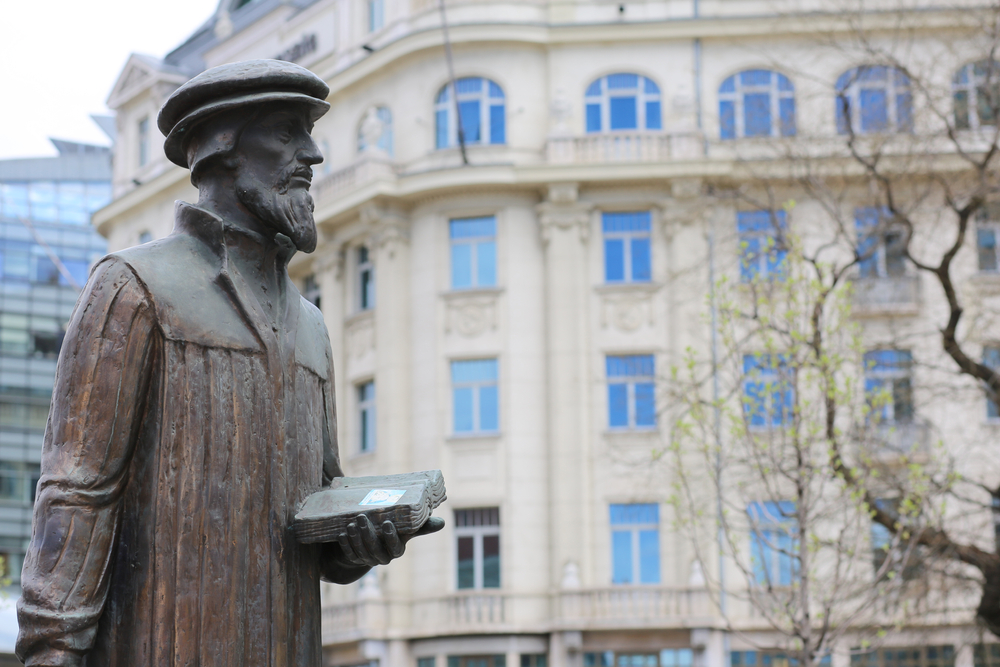Though primarily a theologian, the famous Reformation figure John Calvin had much to say about the application of biblical principles to politics. His focus on the sovereignty of God in all aspects of Creation led Calvin to believe in God’s ordinance not only in the spiritual realm, but also in civil government. Citing Scriptural passages such as Proverbs 8:15-16 – “By me kings reign, and princes decree justice. By me princes rule, and nobles, even all the judges of the earth” – Calvin demonstrated that all governments are ordained by God. In Calvin’s mind, therefore, the rule of civil authority was paramount to the governance of society.
Law had been the subject of Calvin’s studies before he joined the Reformation movement. Although originally decided for the priesthood, Calvin had been sent to Orleans to study law by his father following a dispute with a local bishop in Paris. It was in Orleans that the importance of the legal order was first engrained into his mind. From there, he moved to Bourges to study under Andrea Alciato, an ingenious Italian humanist lawyer who taught Calvin new ways of studying and analyzing historical legal sources. Calvin would later use these skills in his analysis and interpretation of the Bible. All his training in France would prepare Calvin for a life of theology and statesmanship in Geneva.
The need for the rule of law was rooted in Calvin’s soteriological doctrine of total depravity. Man is intrinsically sinful, and apart from God’s grace, he can do no good. Ever since the sin of Adam and Eve, all mankind has inherited a sinful nature, and man will consistently seek his own sinful desires unless God intervenes. As Paul observed in Romans 3:10-12, “As it is written: ‘There is no one righteous, not even one; there is no one who understands; there is no one who seeks God. All have turned away, they have together become worthless; there is no one who does good, not even one.’” Apart from the church and God’s law, secular society requires civil law to rein in man’s depravity. Calvin made this clear in his sermon on Galatians 3:19-20 entitled “The Many Functions of God’s Law,” given in 1558:
Were we like angels, blameless and freely able to exercise perfect self-control, we would not need rules or regulations. Why, then, do we have so many laws and statutes? Because of man’s wickedness, for he is constantly overflowing with evil; this is why a remedy is required.
This quote may sound familiar, it reflects the words of James Madison in Federalist No. 51, “If men were angels, no government would be necessary.” Madison had studied law in Princeton at a Presbyterian institution, where Calvinist doctrine was woven throughout the curriculum and man’s inherent fallibility had a large influence on political philosophy.
Abraham Kuyper, an intellectual descendant of John Calvin, would expand upon Calvin’s ideas. He argued not only that civil government, but ultimately constitutional government could be derived from Calvinist doctrine. In 1898, Kuyper gave a series of lectures known as the “Stone Lectures” at Princeton Seminary upon invitation from B.B. Warfield. In one of his lectures, he discussed at length Calvinism’s implications for politics. He echoed Calvin’s belief that all governments are ordained by God. Kuyper explained that because all men are inherently sinful, man cannot rule over man unless his authority is given to him by God. He proceeded to differentiate between the sovereignty of that State and the sovereignty of “social spheres.” The social spheres of marriage and the family, business, art, and science are not products of the State, but are organic functions of society and therefore sovereign unto themselves. Hence, a tension arises between the State and these social spheres, each of which are made sovereign by God. Thus Kuyper declares, “It was the so-called ‘constitutional government,’ which endeavored more firmly to regulate the mutual relation of these two. And in this struggle Calvinism was the first to take its stand.”
